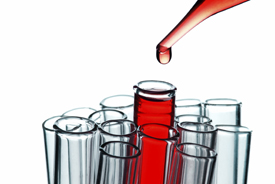Efficacy in a vaccine trial is assessed through the production of protective antibodies against the infectious agent. Measurement of the neutralizing effect of these antibodies is performed through cell-based assays. Over the past years, additional assays have been introduced in vaccine trials in order to get a better understanding of the vaccine’s mode of action on the immune system. These assays allow for the monitoring of T-cell responses in subjects upon vaccination, including the humoral response (supported by CD4 helper T cells) and the elimination of infected cells by CD8 cytotoxic T cells (cellular response). The mechanism can be further characterized through the profiling of the CD4 T cell polarization: Th1, Th2, Th17 and/or follicular helper T cells (Tfh), all of which can have an impact on the resulting therapeutic effect.
Flow cytometry and multimer detection can be used to follow an antigen specific T-cell response and reveal a specific TCR. However, this method allows to follow only one antigen and the functional state (effector/anergic) of the cells remains unknown. Given these limitations, most trials now employ ELISpot and ICS to reveal both the antigen-specificity and the functionality of the immune response induced by the treatment.
Performing both ELISpot and ICS assays requires a lot of starting material (PBMC isolated from whole blood), which might not be accessible. The question then arises: which method to use? ELISpot or ICS?On one hand, the ELISpot is commonly considered more sensitive than the ICS assay while requiring less amount of PBMC. On the other hand, the ICS allows for the measurement of cytokines as well as surface and intracellular markers to generate a more complete cellular profile but consumes more of the precious PBMC material.
During this webinar, the panelist will present characteristics of both methods as well as their advantages and limitations, approaches to define optimal assay conditions during development for robust assay performance and maximal data gathering, validation approaches based on intended use of the data, and how to deploy these assays using appropriate criteria for control and study samples during sample analysis in infectious diseases (i.e., COVID-19) and immuno-oncology vaccine trials.
At the end of this webinar, participants will have a clear understanding of these assays along with key elements to consider for the selection of the appropriate method to investigate the efficacy of their vaccine.
Speaker

Philippe Pouliot, PhD, Director Development Team (Immunology), Caprion Biosciences Inc.
Philippe Pouliot is a trained immunologist. Through his years of research (PhD, postdoc, and industry), he worked on multiple aspects of immunology: from allergies to infectious disease, from vaccination to inhibitors of signaling molecules, and from animal to human studies. Through these projects, he came to appreciate the importance of selecting the proper tool to answer a given question. As Caprion’s director of the immunology assay development team, he now helps sponsors select the assay which will serve them best in their clinical trials. He additionally provides support during the following step of assay development to ensure assay performance and optimization meet expectations.
Who Should Attend?
This webinar will appeal to those in the biotech and pharma industries working in the departments/areas of infectious disease, immunology, vaccine and oncology research in the following roles:
- CEO/ CSO
- Managers
- Researchers
- R&D Associates
- Clinical Scientists
- Team Leaders
- Heads of Pharmacology
What You Will Learn
- Advantages and limitations of ICS and ELISpot for clinical trials
- How to design ICS and ELISpot assays for maximal data gathering
- Critical development and validation approaches to consider with ICS and ELISpot assays in order to fulfill regulatory requirements
Xtalks Partner
Caprion – HistoGeneX
Caprion – HistoGeneX is a leading provider of specialized precision medicine services to the biopharmaceutical industry including flow and mass cytometry immune monitoring, quantitative mass spectrometry, molecular profiling, as well as quantitative immunohistochemistry.
Leveraging its integrated platforms, Caprion-HistoGeneX supports the entire drug development cycle, from discovery to clinical trials. The company operates globally with laboratories located in Canada, USA, Belgium, UK, Australia, and China.
For more information: www.caprion.com and www.histogenex.com
You Must Login To Register for this Free Webinar
Already have an account? LOGIN HERE. If you don’t have an account you need to create a free account.
Create Account





